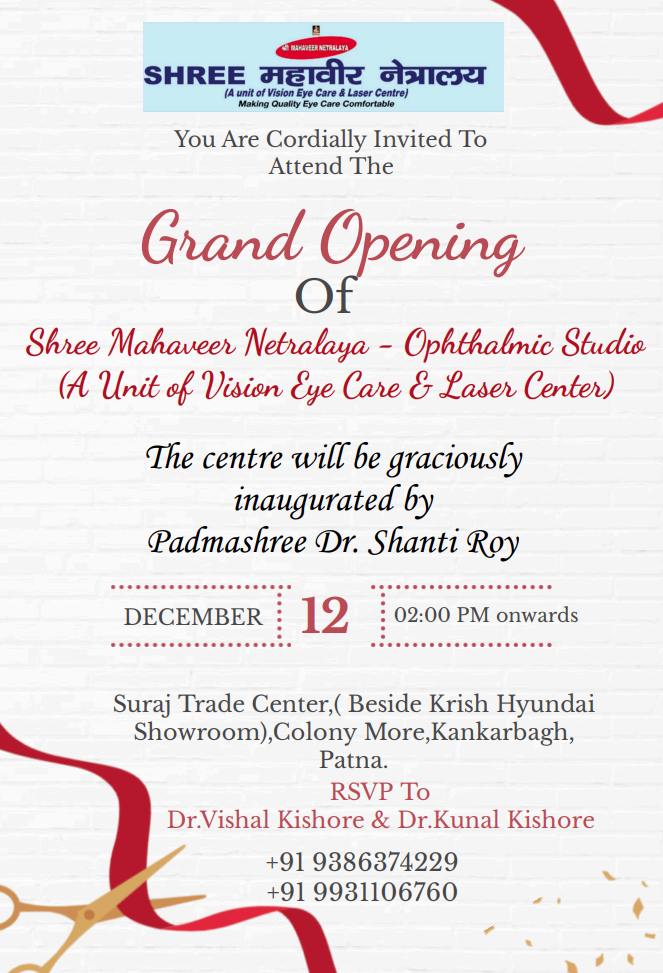
Surgical Procedure
Retinal Treatment
All Treatments
Retinal Treatment
Providing advanced surgical solutions to repair retinal detachment and preserve your vision

What is Retinal Detachment?
Retinal detachment occurs when the retina gets separated or pulled away from it’s normal position, the light-sensitive tissue at the back of the eye, separates from the underlying layer of blood vessels called the choroid. This separation can cause vision loss and blindness if left untreated.
Types of Retinal Detachment
- Rhegmatogenous retinal detachment: Most common type, caused by a tear or hole in the retina.
- Exudative retinal detachment: Caused by fluid accumulation under the retina, often due to diabetes, tumors, or inflammatory diseases.
- Tractional retinal detachment: Caused by scarring or fibrosis that pulls the retina away from the choroid.
Symptoms of Retinal Detachment
- Sudden vision loss or blurred vision
- Flashes of light (photopsia)
- Floaters or cobwebs in the visual field
- Shadow or curtain descending over the visual field
- Eye pain or discomfort
Causes and Risk Factors
- Age-related wear and tear
- Diabetes
- High myopia (nearsightedness)
- Family history
- Previous eye surgery or trauma
- Retinal tears or holes
- Tumors or cancer
Diagnosis
- Comprehensive eye exam
- Visual acuity test
- Dilated fundus exam
- Ultrasound or optical coherence tomography (OCT) imaging
Treatment
- Surgery (vitrectomy or scleral buckling)
- Laser photocoagulation
- Cryotherapy
- Pneumatic retinopexy (gas bubble injection)
- Intraocular injections (for exudative detachment)
Prevention
- Regular eye exams
- Diabetes management
- Protective eyewear for sports or activities
- Avoiding smoking and UV exposure
Retinal Detachment Surgery Recovery
- Hospital stay: 1-2 days
- Rest and recovery: 2-6 weeks
- Follow-up appointments: regular check-ups
- Vision rehabilitation: may take several months
Frequently Asked Questions:
- How is retinal detachment diagnosed? Retinal detachment is diagnosed through a comprehensive eye exam, including dilation to thoroughly examine the retina. Advanced imaging tools like optical coherence tomography (OCT) or ultrasound may also be used to confirm the diagnosis.
- Is retinal detachment surgery painful? Most retinal detachment surgeries are performed under local anesthesia, ensuring that patients experience minimal to no pain during the procedure. Some discomfort may be felt after the surgery but can be managed with prescribed medications.
- Can retinal detachment be prevented? While not all cases can be prevented, regular eye exams can help detect retinal issues early. If you have risk factors like high myopia, previous eye surgery, or a family history of retinal detachment, regular monitoring is crucial.
- Will my vision return to normal after retinal detachment surgery? The outcome depends on how severe the detachment was and how quickly it was treated. Prompt treatment can often restore vision or prevent further loss, but some vision loss may be permanent in severe cases.
Schedule Your Retinal Detachment Consultation
If you’re experiencing any symptoms of retinal detachment, such as flashes of light or a shadow over your vision, don’t delay, immediate care is crucial. Schedule your consultation with our expert retinal specialists today to discuss your condition and explore the best treatment options.
 +91 9939829148
+91 9939829148 visionlasercentre@gmail.com
visionlasercentre@gmail.com +91 7761882875
+91 7761882875
